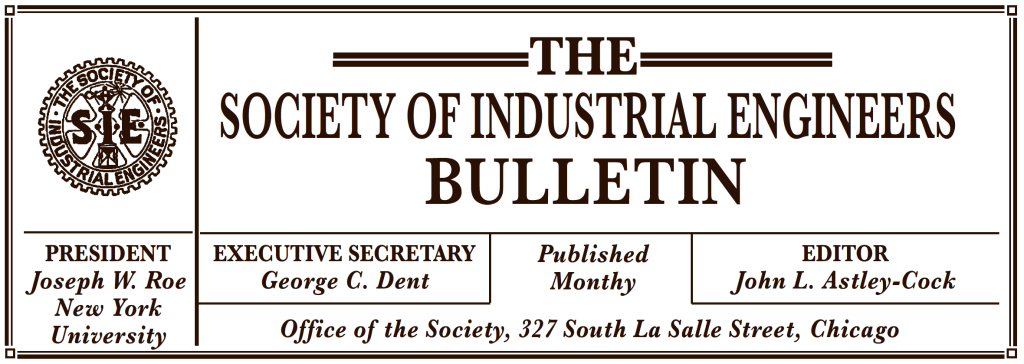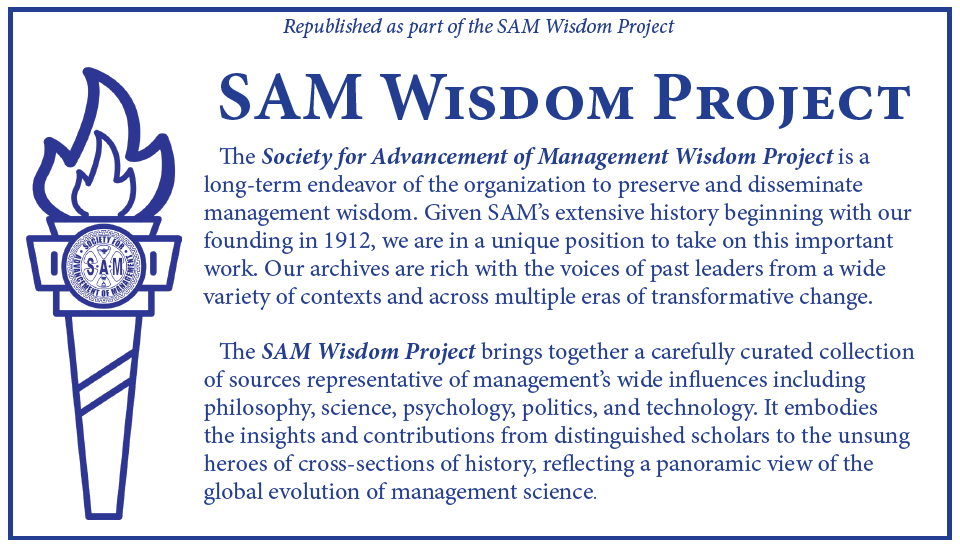
CINCINNATI
In view of the importance of preparing adequately for the Spring convention in April this chapter has decided to forego, until after that event, all open meetings in order to confine its energies to the completion of all arrangements incident thereto.
On January 18, at a business meeting, the Executive Secretary held a conference with the members regarding the convention program, the appointment of committees, inspection trips, entertainment features and all those other details so necessary to the success of such an
enterprise.
Owing to the diversity and accessibility of manufacturing plants in this city the list of inspection is arranged most attractively and one trip is specially scheduled for the particular delectation
of the ladies attending this convention. Exceptionally fortuitous is the cooperation of the University of Cincinnati. The faculty is in hearty accord with the entire program. Several of the professors and some of the students in engineering will assist in running various parts of
the convention machinery. So much for the present. More will be told in due time, but so far everything bespeaks a top-notcher in the way of conventions at the Queen City.
ATLANTIC
The executive committee of this Chapter held a meeting Wednesday, January 10 at the Engineers’ Club when the following business was transacted:
The project of forming a “consulting staff” for the benefit of the local membership was discussed and it was decided that Oscar L. Preble, Vice-President, should issue notices stating that this subject would be brought up again at the next general meeting and that the final decision will be made at the next Executive Committee meeting.
A. G. Coffin, E. B. Morgan and O. L. Preble were appointed as a committee to consider definite plans for the increasing of membership and ordered to report on the same at the next meeting of the Executive Committee.
W. M. C. Kimber was constituted a committee of one in charge of research.
January 31st the Chapter as a body accompanied by guests made an inspection trip to the Richmond and Tioga plant of the Dill and Collins Company.
NEW YORK
The monthly meeting was held Tuesday, January 9, at the Engineers’ Building, 29 West 39th Street. It was the second meeting in the Kortex Rubber Co. series and the stockholders had brought some of their friends in to witness the clash between the Works Manager, H. R.
Gilson, and the Sales Manager, H. W. Kuehne. The former did a most discreet thing. He excused himself before the Sales Manager got fairly warmed up. Like all board meetings of defunct companies, much was said about the president who “took up golf,” and little was said as to what we must do. At this juncture an irate stockholder arose and after explaining that he had come in
from Buffalo to represent a large block of stockholders, said that all the talk about increasing sales and increasing production sounded fine, but what he wanted to know was “where in hell are
you going to get the money for advertising and improvements?” This made everybody sit up and take notice. The inquiry turned in the direction of the banker-director, who decided since it was
a work of love, his bank would float bonds which would only cost the concern 10 per cent. More exact data was demanded and the final action was laid over for a subsequent meeting. The hard-
boiled stockholder from Buffalo proved to be no other than William B. Powell of the F. A. E. S. Executive Board.
The next meeting of this chapter will be held Monday, February 12, which the National officers and directors of the Society are expected to attend.
CLEVELAND
The meeting Wednesday, January 24, was the second under the recent plan of round-table noon-day discussions which is proving so successful. Harry F. Porter led the discussion on “Financial
Control,” and the chief point substantiated was the use of the budget as a mechanism for financial control. Considerable time was allotted to determining what information was necessary in order that the budget might be practical in its application. This, however, is an extensive subject and since the ground was not nearly covered at that session it was decided to continue the discussion at some future meeting. The next meeting is scheduled for Wednesday, February 7. The subject will be “Personnel Control,” led by F. H. Doolittle, employment manager of the Telling-Belle Vernon Company.
CHICAGO
The February dinner meeting will be held Tuesday, February 20, at the City Club on which occasion the Chicago Section of the Taylor Society and the Western Efficiency Society will be guests of the local chapter.
John F. Gilchrist, Vice-President Commonwealth Edison Company, will speak on “Practical Financing.” He will consider some aspects of financing as they present themselves to the executive, the use of finance companies, the discounting of bills, customer ownership of securities, the proper kind of security to issue and similar matters. The Chair will be occupied by Fred. Scheel, Vice-President, Utilities Securities Company, and the leader of the discussion will be R. O. Osgood, Vice-President, First Trust and Savings Bank, Chicago.
Both the regular January meetings were devoted to the same topic, “The Business Cycle.” On account of the magnitude and importance of this subject a single session would not have sufficed
and a digest of these proceedings is published elsewhere in this issue.
MILWAUKEE
At the regular monthly meeting held Tuesday, January 16, at the Public Library, W. T. Bowker of the American Appraisal Company spoke on “Depreciation.” He has made particular study of
Depreciation and Obsolescence and combined with his practical experience in the field he was able to explain in detail the procedure for determining depreciation. He stated, however, that there existed no real or average rate which could be used since there were too many variant fac-
tors. For instance, in machinery; the time consumed in operating; and in premises, buildings near water deteriorated more rapidly than those inland.
NORTHWEST
Following a considerable period of quiescence in this chapter revival is now under way. W. W. Nichols, Detroit, Chairman of the National Membership Committee, recently visited Minneapolis for a conference with the members. He reports that there will be a meeting in
the near future to elect officers for the current year and that plans are being formulated regarding resumption of chapter activities.
DETROIT
The chapter held its regular evening meeting Tuesday, January 16, at the Hotel Cadillac, with an excellent attendance. A number of guests was present, among whom were representatives from the University of Detroit, University of Toledo, University of Michigan, Detroit Institute of Technology, and groups of foremen from various manufacturing plants in the city.
President Allan B. Crow, following his introductory speech, turned the meeting over to Professor R. B. Gordy, of the Engineering Department of the University of Michigan.
R. S. Perry, Planning Manager of the Hudson Motor Car Co., was the first speaker. He discussed: “The Future Possibilities of the Planning Department in the Automotive Industries.”
Coordination is the secret of success in the Planning Department. Designation of the amount of work to be accomplished by every department by day, week, or month is part of its work. As every department is a link in the chain of production it is necessary that each coordinate with other departments performing all preceding and succeeding operations.
A planning department to be effective must have a well-informed personnel; and this information must be accurate. Not only must it have, but it must be able to pass on this information to every unit with which it has to deal. In fact, on efficiency of personnel depends success of operation, consonant with a knowledge of the aims and plans of the company.
A steady daily, monthly, or yearly output, without fluctuation, is the aim to be reached.
Mr. Perry’s conception of the perfect factory is one in which the departments are so coordinated that they become a continuous belt, at one end of which the raw material is fed in, at the other the finished product emerges. It is, of course, understood that an attitude of non-interference with the work within the various departments be maintained.
Harrington Emerson was present and gave his “Seven Steps to Successful Enterprise.” These steps, progressively stated are as follows:
- Determining the fundamental bases upon which the industry rests.
- Reasoning correctly from these bases.
- Securing correct information regarding the industry itself.
- Having attainable ideals.
- Adopting workable methods.
- Attaining of ideals.
- Having a habit of attaining ideals.
Everywhere is seen the results of the lack of understanding of the fundamentals underlying industry; a notable example of which are the railroads of this country, representing an investment of $20,000,000,000, but whose revenues are entirely insufficient to sustain such an investment. Remedy may not be found in increased rates, for a reduction in the volume of business follows an increase in rates. Determining the revenue desired from an industry should be the first step in its establishment, and then from this basis determine the amount of money to be invested. Most industries, including railroads, have reversed this order; first fixing the amount of the investment, and then trying to make the revenues sustain that investment. Another element to be considered is the quota of the country labor to which the industry is entitled. Our railroads are entitled to seven and one-half per cent, and were using all of that amount, so when the working day was decreased from ten to eight hours, they were compelled to draw labor from other industries. All industries have costs over which they have no control, such as taxes, insurance, etc., but operating costs which are in most cases entirely too high, may be controlled, and therefore offer a subject for deep consideration.

